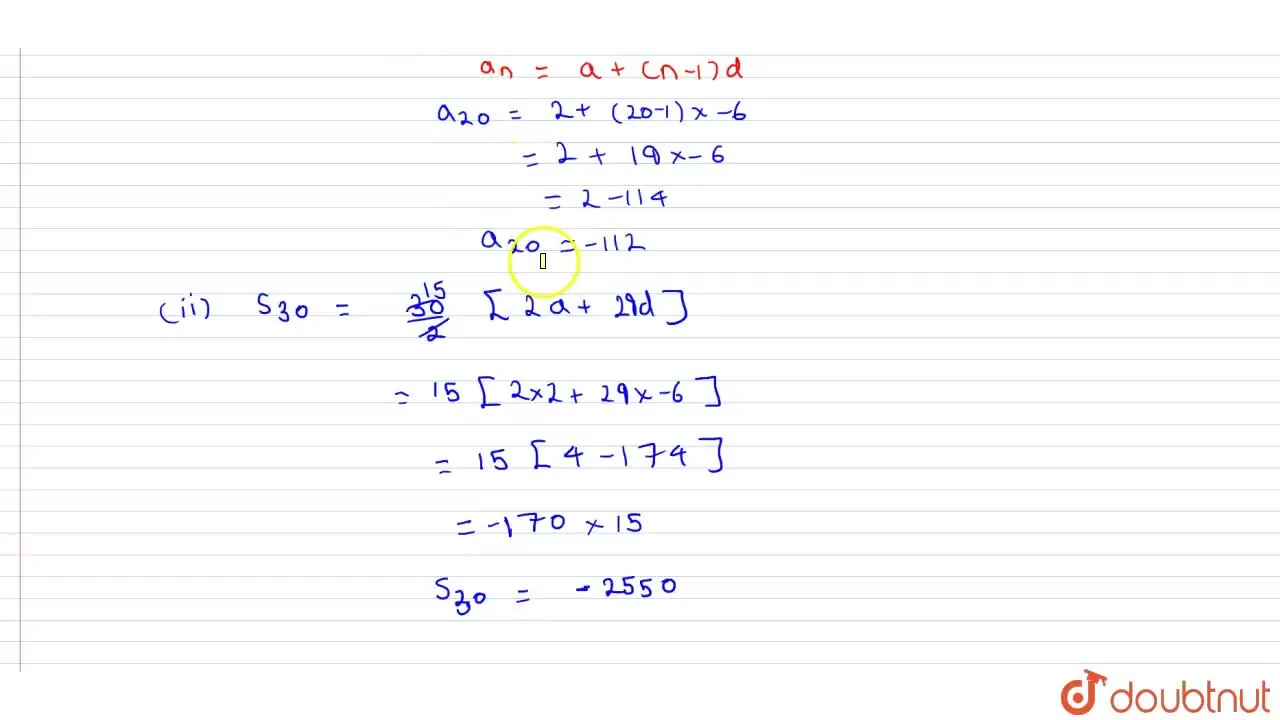If the first term of an A.P. is 2 and the sum of the first five terms is equal to one fourth of the sum of the next five terms, find
(i) the 20th term
(ii) the sum of first 30 terms.
The correct Answer is:(i)-112 (ii) -2550
Step by step video, text & image solution for If the first term of an A.P. is 2 and the sum of the first five terms is equal to one fourth of the sum of the next five terms, find (i) the 20th term (ii) the sum of first 30 terms. by Maths experts to help you in doubts & scoring excellent marks in Class 11 exams.
Related Playlists
- BOOK - MODERN PUBLICATIONCHAPTER - SEQUENCES AND SERIESEXERCISE - EXERCISE 9 (d) SATQ7videos
SEQUENCES AND SERIES
- BOOK - MODERN PUBLICATIONCHAPTER - SEQUENCES AND SERIESEXERCISE - EXERCISE 9 (e) LATQ8videos
SEQUENCES AND SERIES
- BOOK - MODERN PUBLICATIONCHAPTER - SEQUENCES AND SERIESEXERCISE - EXERCISE 9 (c) SATQ7videos
SEQUENCES AND SERIES
- BOOK - MODERN PUBLICATIONCHAPTER - RELATIONS AND FUNCTIONSEXERCISE - Chapter Test11videos
RELATIONS AND FUNCTIONS
- BOOK - MODERN PUBLICATIONCHAPTER - SETS EXERCISE - CHAPTER TEST 112videos
SETS
Similar Questions
If the first term of an AP is 2 and the sum of the first five terms is equal to one-fourth of the sum of the next five terms, then what is the sum of the first ten terms?
View SolutionIf the first term of an A.P. is 2 and the sum of first five terms is equal to one fourth of the sum of the next five terms, find the sum of first 30 terms.
View SolutionIf the first term of an AP is 2 and the sum of the first five terms is equal to one-fourth of the sum of the next five terms, then what is the sum of the first ten terms?
View Solution7th term of an A.P. is 40. Then, the sum of first 13 terms is
View SolutionIf the first term of an AP is a and the sum of the first p terms is zero, then the sum of its next q terms is
View SolutionIn an A.P., the first term is 2 and the sum of the first five terms is one-fourth of the next five terms. Show that 20th term is -112.
View SolutionIn an AP, the first is 2 and the sum of first five terms is one - fourth of the sum of next five terms.show that its 20th term is -112 and the sum of its frist 20 terms is -1100.
View SolutionIf the first term of an A.P. is 100 and the sum of its first 6 terms is five times the sum of the next 6 terms then its common difference is
View SolutionThe 5th term of an AP is 50. Find the sum of first 9 terms.
View SolutionIn an A.P., the first term is 2 and the sum of the first five terms is one-fourth of the next five terms. Show that 20th term is 112.
View Solution


